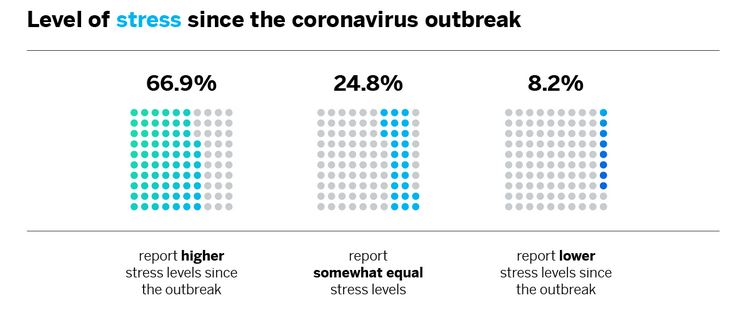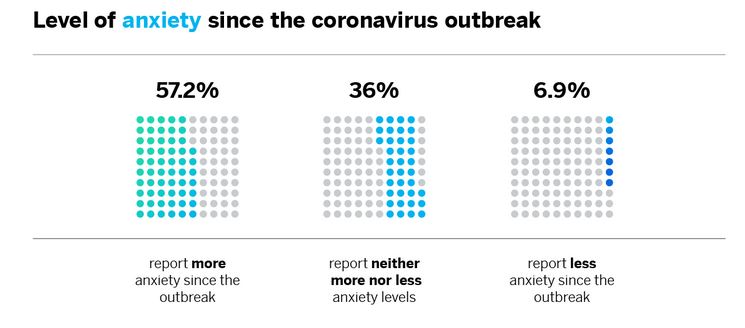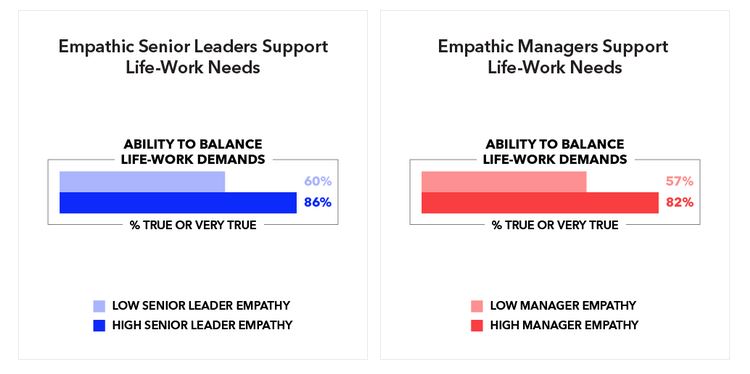I know I’ve been talking about the pandemic quite a bit over the last few months, and I’m sure many of you were already sick of hearing about it before I started discussing it.
But the truth is, the pandemic has changed our lives forever, not least when it comes to things like workplace dynamics and mental health.
Throughout the pandemic, and now in today’s post-pandemic world, people’s mental health has deteriorated, and there is scarcely a person in this world who hasn’t been affected.
Either people are terrified to leave the house and be around other people, depressed about the state of the world, indignant because of the restrictions that have been placed on their lives, caught up in divisive pandemic politics, or suffering from something else entirely.
A survey from Qualtrics of more than 2,000 employees around the world shows just how bad things have become.
Over two-thirds of respondents said they’re more stressed out now than they were before the pandemic, more than half said they’re feeling sadder and more irritable, 57 per cent said they’re more anxious, and 54 per cent said they’re more emotionally exhausted, among a host of other issues.


In any case, these factors have placed an incredibly difficult burden on employers, who are now finding it difficult to cope with this post-pandemic fallout, which includes things like lack of productivity, staff incessantly calling in sick, employees quitting or retiring in droves, and the inability to find the right people to fill vacant positions.
Empathy is intimately related to all these aspects, and its importance has become even greater as these things play out post-pandemic.
That being said, if leaders don’t apply this skill in their workplace interactions, they’re going to make their jobs much more difficult, not to mention those of the employees whom they manage.
So, if you’re struggling to deal with post-pandemic fallout, or you’re just looking to do whatever you can to develop leadership skills, then you’re going to want to keep reading.
In this article, I’m going to discuss why I firmly believe the most important post-pandemic leadership skill is empathy, and explain how that relates to several issues in the workplace.
Why is Empathy Such an Important Leadership Skill?
Well before the pandemic, I was screaming about the importance of empathy as a leadership skill, and with the way things are in the world today, I have no doubt that it will continue to become even more crucial.
Now, before I continue, I think it’s important to define empathy, as opposed to sympathy, because these terms do not refer to the same thing.
Sympathy refers to having pity for someone, whereas empathy is more about being able to understand someone else’s feelings, and put yourself in their shoes, so keep this in mind.
At any rate, as a leader, if you want things to run smoothly between you and your employees, you need to foster three main things: trust, respect, and loyalty.
Without them, the relationships between you and your employees, and the relationships between all the members of your organization, for that matter, are going to suffer.
How does this relate to empathy?
Well, showing empathy as a leader is one of, if not the most effective way, to gain the loyalty, respect, and trust of your employees.
Simultaneously, when you create this kind of atmosphere in the workplace, you’re setting the best possible example, and it’s going to rub off on the rest of your team.
With that said, let’s take a look at how empathy relates to several post-pandemic workplace-related issues that are becoming increasingly significant.
Sick Leave

The pandemic might be over, but it appears COVID is here to stay, and that means people are calling in sick more than ever before.
Unfortunately, some things never change, and just like prior to the pandemic, there are going to be those who take advantage of the situation and call in sick, regardless of whether they have COVID, or anything else, for that matter.
In any case, if you’re a leader, you can use empathy to make these situations easier to deal with, both for yourself and those who are taking time off.
However, it’s crucial to understand that in these scenarios, the most effective use of empathy comes before anyone ever calls in sick.
What does that mean?
Well, if you employ empathy proactively, and create an environment where employees already know that you care about them, they’re going to be more loyal, and also more likely to care about you, and have more respect for you.
That being said, they’re going to be much less likely to lie about being sick, and if they are sick, they’ll be less likely to milk it for all it’s worth, as they won’t want to leave you in the lurch like that.
At the same time, when someone does call in sick, you should show empathy, both in terms of what you say, and how you say it, and you should avoid making snide remarks about people who do call in sick, as this only works to create a toxic environment and erode the trust, respect, and loyalty you’ve worked so hard to build.
But if you haven’t bothered to proactively show that empathy to employees, by the time someone calls in sick, it’s almost too late, as both parties will now be in a reactive state, making conflicts and issues more likely to arise.
So, if someone does call in sick, be empathetic toward them, but more importantly, do whatever you can to make sure your employees already know that you care before they ever ask for sick leave.
Work-Life Balance
Given the fact that people’s ability to deal with stress has plummeted, it’s more important than ever to ensure employees have a proper balance between their work and personal lives.
Relating this back to empathy, let’s consider what it’s like to deal with a leader who shows little or no empathy toward their employees.
Obviously, when someone is dealing with this kind of boss, and everything that goes along with that, like being belittled, getting ridiculed in front of coworkers, or constantly being criticized, then their mental health is going to be negatively affected, and they’re going to bring that home with them.
As a result, they’re going to be more likely to experience things like losing sleep, being less motivated, and feeling less confident, not to mention taking their frustrations out on family members, and all of this blurs the line between their professional and personal lives.
In these kinds of situations, work-life balance is bound to suffer, as even when they’re at home, they’re still not really getting away from work because they’re always worried or otherwise obsessing about it.
A survey from Catalyst found that when leaders and managers show more empathy, their employees feel much better equipped to balance the obligations of both their work and personal lives.
Respondents were asked if their leaders and managers showed a low or high level of empathy, and then each sub-group was asked about how that affected their ability to balance the demands of their work and personal lives.
Not surprisingly, workers whose leaders showed a high level of empathy felt considerably more confident in this ability, with 86 per cent saying they’re able to balance their work-life demands, versus only 60 per cent of those who said their leaders showed a low level of empathy.

So, if you’re a leader, it pays to show empathy, as you’re going to have more confident, motivated, and productive employees, and they’re going to feel like they have a better work-life balance, so obviously they’ll be more likely to stick around, as well.
Employee Engagement
Now, I know the term employee engagement gets thrown around a lot, so before I continue, I should be clear about what I mean when I use this term.
To me, employee engagement refers to how well an employee aligns with the objectives and culture of the company they work for.
In other words, the more engaged an employee is, the closer they’ll feel to their employer, and the more meaningful and fulfilling their work will be for them.
These kinds of employees care about what they do and are far less likely to just do the bare minimum and wait to collect their paycheck.
That being said, one of the best ways to keep employees engaged, and ensure they care about what they do, is to show them you care about them by exuding empathy.
The Catalyst survey I mentioned above also asked respondents about how engaged they are at work in relation to the level of empathy shown by their leaders.
Of those respondents whose leaders show a high level of empathy, 76 per cent said they often or always feel engaged in their work, while only 32 per cent of respondents with less empathetic leaders report feeling engaged at work.
While I’m at it, I should mention that one of the best ways to show empathy and help keep employees engaged is to organize team-building events.
It might sound cheesy, but the camaraderie and cohesion created by these kinds of outings can really bring a team together, and when team members get to know each other better, it can have a significant effect on how engaged they are.
In addition, organizing these kinds of events shows empathy in and of itself, because as a leader, it shows you care about the unity of your team, and you want them to get out of the office and have some fun every once in a while.
And aside from just setting a positive example, team-building events also work to teach your employees to have empathy for each other, and that can work to ensure every member of your organization is more compassionate, which is always a good thing.
Are you interested in learning more about how to improve leadership skills? I’m a certified leadership coach, and I’ve worked with countless people in leadership positions to help them hone their skills. Contact me to find out more about how I can help you become a better leader.
